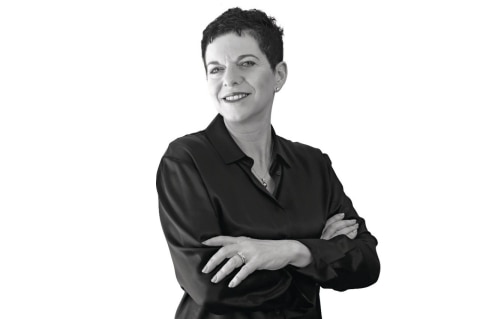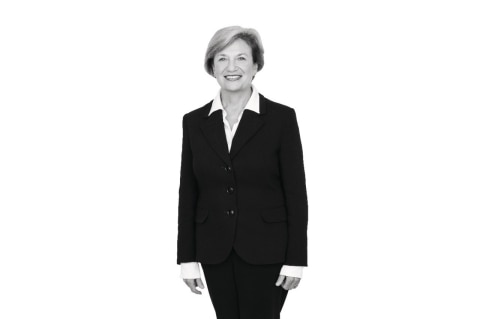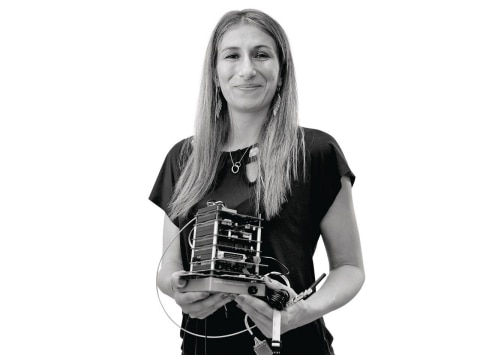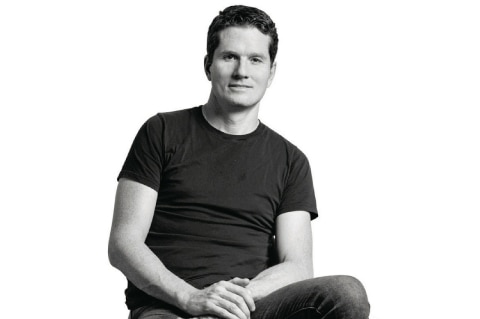Lessons From The Most Inspiring Leaders of 2018

In a year when leadership has been headline news around the world, it’s more important than ever to focus on the real deal. And that means looking not only at those charting a steady course in the mainstream but beyond to emerging sectors and the social-purpose arena. Our list of 2018’s best in eight categories makes it clear that while successful leaders have their own approach to running the show, they share a belief that leadership is effective stewardship marked by clarity of purpose and strong values.
Philanthropic Leader: Deanne Weir
Chair of Ai-Media and Hoodlum and director of The WeirAnderson Foundation

DEANNE WEIR has more than 25 years’ experience in media and communications. She chairs the WeirAnderson Foundation, which invests in women’s causes, has held executive roles with Austar and Foxtel and chairs the boards of two private companies in which her company, WeirAnderson.com, is a large investor: Hoodlum, the Emmy- and BAFTA-award-winning production company behind TV series Harrow and Secrets & Lies, and Ai-Media, a technology and social innovation company. She describes what leadership means to her.
“As I look at my life and what I want to do, I see this great bonding of the business world with social purpose and culture. I want to be involved in purpose-driven businesses. So it’s about telling great stories through Hoodlum or supporting not-for-profit organisations through the foundation. In a sense, my purpose is to run businesses that are for-profit and build capital so we can invest in social causes. I call myself an everyday philanthropist.
Our entire concept of leadership has to change. When you talk about business leaders you have this image of a CEO, the guy in the suit. Whereas a leader is someone who decides, in business or the social sector, to stand up and say they want to help others and the organisation and community to be better. We all need to think about the ‘be better’: not just better profits but better services, better people. What is the purpose? That’s what a leader is – someone looking towards that purpose.
We are reaping the negative results of that “win at all costs without worrying about the consequences” approach to leadership, as you can see from the banking royal commission. It comes back to our overall capitalist model of growth and more growth, which would be great in a world of infinite resources but that’s not where we live. We need to revisit our definition of success. A lot of entrepreneurs are women changing their communities. Equality and investing in women and girls isn’t just practical, it’s the right thing to do.
I’m very lucky that I had John Porter, who was CEO of Austar [1995-2012], as a leader. He was very empowering, giving guidance and support to go ahead and be the best you can be. People think leading is all about them; it’s actually about the team. The leaders who really get it are looking to find people who are smarter than them; they don’t feel they have to be the smartest in the room. I’m an inclusive leader and do try to empower people. I love to hear about the lives of the people who work with me. It’s part of the role. And I like to have fun.”
Thought Leader: Ross Garnaut
Research fellow in economics at The University of Melbourne and president of Simec Zen Energy
The author of the Garnaut Climate Change Review has served as a principal economic advisor to prime minister Bob Hawke, as an ambassador to China, division head of finance in Papua New Guinea and the chair of Bankwest. As president of SIMEC Zen Energy, the professorial research fellow in economics at The University of Melbourne has partnered with billionaire steelmaker Sanjeev Gupta to set up an array of renewable energies to feed mills and supply other large energy users.
As your career took you through Asia and the Pacific, did you observe practices that have influenced your leadership style?
In Indonesia and some other Asian countries, one sees an awareness of the importance of explaining to people where you’re coming from and where you’re going and bringing a community along with you. That is seen more closely than in Western countries as an important dimension of leadership.
What’s something you’ve learned about leadership that’s surprised you?
It was from working closely with Bob Hawke and seeing how far you could go in getting people to accept change they found in advance to be difficult and unattractive. I was surprised at how far-reaching the reforms turned out to be; how much they were able to change what had been well established but counterproductive Australian paradigms.
How did Bob Hawke do it?
It began with a personality that tended to be appealing and persuasive but he put huge effort into understanding the different perspectives of people who were opposed to change, explaining to them the shared interest in change and then working with them to find a way forward that reconciled the most important objectives of the various parties with what needed to be done in the public interest.
Which of your achievements do you consider most important?
I’d say working with the first secretary for finance in Papua New Guinea to establish a sound foundation for stable macro-economic policy in the years straddling independence. The second would be my work on reform and internationalisation of the Australian economy under the Hawke government. The third would be the contribution I made to Australian understanding of the importance of developments in Asia, including China, over many decades.
How do you decide where to give your time with so many issues pressing for attention?
I must confess that I’m not as scientific as I might be about it. Over my life I’ve accumulated very broad interests and I’ve accumulated interests rather than dispose of them.
What are your goals for the next year?
I’d like Zen Energy to have made major progress in supplying low-cost sustainable energy to support the rehabilitation and then the expansion of Australian industry. And I’m hoping to put to bed a book that makes sense of the unusual global economic challenges we all face.
What has been your biggest challenge?
I suppose the long struggle to affect the Australian response to climate change, through which we could do our fair share in a global sense. We’re still in the early stages of energy transition and the transformation of the Australian economy that’s going to be necessary.
Does dealing with issues that significant exact a personal toll?
It’s certainly exhausting from time to time but I’ve been working on contentious public policy issues for a very long time so I know these things are hard. In my letter of transmission of my first report on climate change to the Australian premiers and the prime minister in 2008, I referenced the old bush saying, “an old dog for a hard road”.
Are you attracted to contentious issues?
Not for their own sake but sometimes one can’t avoid them if one is to deal honestly with the world as one sees it.
There’s been a lot of discussion about leadership in 2018. Do you have any ideas on how to improve it?
There’s a lot of wisdom in old knowledge on these things. Values of honesty, integrity and dealing with people fairly are tremendously important. Institutions and society as a whole don’t work unless one places proper emphasis on these age-old values.
Change Leader: Ilana Atlas
Chair of Coca-Cola Amatil and Jawun
In key roles at the top of Australian firms for many years, Ilana Atlas has steered a course through times of major change at a range of large companies, including as a director of Westfield Corporation as it finalised its sale to Europe’s Unibail-Rodamco early in 2018. Starting as a tax lawyer, she spent 15 years as a partner at Mallesons Stephen Jaques (now King & Wood Mallesons) and 10 years in senior roles at Westpac before moving to a full-time boardroom career eight years ago. In 2017, she succeeded David Gonski as Coca-Cola Amatil (CCA) chair. She is also a life member of Bell Shakespeare Company.

But these days Atlas could just as easily be found in the Kimberley with a network of 60 Indigenous and non-Indigenous women as part of her role as chair at Jawun, a not-for-profit that manages secondments from corporates to Indigenous communities.
The best leadership advice she’s had was about listening. “I think you can always come to a better decision if you assimilate different points of view and different facts as well. Sometimes there’s a propensity to feel you have to express a view and I have sympathy with that; I mean, people want to hear what you think. Actually sitting back and listening to the room can seem a bit counter to what one feels one should do, so sometimes it does involve self-discipline.”
The same approach goes for leading others through change: “You have to stand in the shoes of the people you’re asking to do the changing… You have to ask, ‘Why would I do that?’ I know that’s trite but it’s hard when you’re trying to implement change with a large group of people and everyone is different.”
And her main strength as a leader? “I’m an influencer, I’m very engaged and don’t do anything I don’t believe in. I like to lead from behind as much as from the front.”
In May, Atlas supported CCA board member Catherine Brenner as she stepped down as chair of AMP following revelations about the company at the banking royal commission. Some media commentary on Brenner was controversial, particularly the revealing of personal details, Atlas says, and didn’t align with her view of doing the right thing. “I did feel strongly about it. That clearly was the right time to stand up and lead.”
Rhetoric questioning the value of measures to get more women on boards was not worthy of too much discussion, she adds, but notes that finally we’re choosing people for jobs from 100 per cent of the population “and not 50 per cent”.
Visionary Leader: Flavia Tata Nardini
Chief Executive Officer Fleet Space
When Flavia Tata Nardini came to South Australia five years ago to be with her now husband, there was no space agency in Australia and few space-based startups. “It was not an optimal environment for my work,” says the Italian rocket scientist in a considerable understatement. Now, she says, Australia has more space startups per capita than any other country – at least 89. The Australian Space Agency launched in July and Nardini is leading the charge.

Her company, Fleet Space Technologies, develops shoebox-sized nanosatellites, which are cheaper than standard satellites and have the capacity to transform industries such as agriculture, mining and logistics. In the next few years, when an estimated 75 billion devices become connected to the web in the Internet of Things (IoT), Nardini’s nanosatellites will be able to check a property’s perimeters, its irrigation needs, even the location of
a stray cow and communicate it to a farmer’s phone. (One client, who measures his 200,000 trees with a caliper, pen and notebook, will be able to track his forest’s regeneration from space.)
The journey hasn’t been easy. “When you run a space startup, you’re dependent on other people,” explains Nardini. There can be years of delays so Fleet created another product, Portal, that leverages existing satellites to ensure a revenue stream and keep employees, customers and investors engaged. And Nardini ignored any advice to reign in her celestial vision. “We have a tendency to scale down sometimes and to forget our dreams. But this is my time to make something big.”
International Leader: Audette Exel
Founder and chair of Adara Group
Elected by the World Economic Forum as a Global Leader of Tomorrow, Audette Exel founded the social impact business Adara Group in 1998, including a not-for-profit development arm supporting communities in Uganda and Nepal. A lawyer who has worked in international finance, she was formerly managing director of Bermuda Commercial Bank and also acted as chair of the Bermuda stock exchange. Exel sits on the board of Suncorp Group Limited.
Did you set yourself career goals?
I’d love to pretend there was a plan but there wasn’t, just a blinding passion for the poor and a determination to do as best I could to contribute around that. As I was leaving uni, I had a realisation: I needed to learn about the world of finance to really have a shot at social change. My career took me through law, banking and then into social entrepreneurship.
Why did you set up the Adara Group?
To find a way to bridge the worlds of the most advantaged with the most disadvantaged. It was an evolution of thinking rather than a single moment of clarity. I was struck by the disconnect between the immense, long-term funding needs of non-profits and the precarious reliance on short-term donations. The idea was to use corporate advice businesses as funding engines for great international development work. I don’t just enjoy work – I absolutely, totally love it. Knowing that Adara touches so many people in need gives me energy, joy and inspiration beyond description.
What are you most proud of?
I am quietly proud and hopeful about our newest business, Adara Partners, which is a corporate advisory firm. It has a panel of some of the most distinguished leaders in the Australian financial services sector: Guy Fowler and Matthew Grounds at UBS, David Gonski and Ilana Atlas [see previous page]. They volunteer for Adara on major transactions for corporate Australia, with all profits going to our work with people living in extreme poverty.
How would you describe your leadership?
Probably it’s best described as “noisy, passionate”. Our teams are truly diverse. Both inside and outside Australia, appropriate respect and understanding of the people, context and settings you are working in is always a good idea.
What advice would you give your younger self?
Be brave and never take no for an answer!
What’s the main misunderstanding people have about being a leader?
There’s this idea that to become a leader you can’t make mistakes. That certainly hasn’t been my experience of leadership. I stand on a mountain of a thousand mistakes and have become a better leader because of them.
Emerging Leader: Luke Anear
Founder and CEO of SafetyCulture
Like all the best tech-business tales, SafetyCulture started in a garage – in Mount Low, Townsville, in 2004, where staff sometimes couldn’t hear each other because of a neighbour’s lawnmower. Advance 14 years and the company now operates globally in five offices with 315 employees. Since the 2012 launch of its iAuditor app and platform, SafetyCulture is now one of the biggest safety and quality databases in the world, collecting more than 30 million responses each month from 80 countries and counting Coles and National Grid UK among its clients.

Founder and CEO Luke Anear, an ex-private investigator who sometimes checked compensation claims, was moved by the devastating impact of workplace accidents. He wanted to shift industry’s focus from compliance to empowering frontline workers to manage safety themselves, with mobile software that allows the quick reporting of incidents and teams to analyse the data in real time.
His company’s growth, says Anear, has been “exhilarating and scary”. His initial focus on perfecting the product has evolved to supporting his people to do their best work. “The reality is that there is always a better way and we have to be open to finding it.”
Young Leader: Natalie Walker
Founder and managing director of Inside Policy
Natalie Walker founded and runs the Inside Policy consultancy, was the first CEO of Supply Nation, which connects Indigenous businesses with government procurement opportunities, and is a former advisor to the Aboriginal & Torres Strait Islander Social Justice Commissioner at the Australian Human Rights Commission.
Did you plan your career?
I planned it from the perspective of choosing or pursuing opportunities that gave me the greatest hope to make positive change and impact. Thankfully, I discovered early in life what really made my heart sing – making large-scale positive reform happen or “changing the system”.
What attracted you to the CEO role with Supply Nation?
The potential to significantly improve the lives of Indigenous Australians. Also to provide advice to governments on complex policy challenges to make our nation a better place for the most vulnerable in our community.
What does great leadership look like to you?
In an organisation, the leader helps their team see what they can achieve. In a political sense, a leader has a clear idea of who we should be as a nation, has a plan to achieve it and communicates that clearly. This requires courage of conviction as you inevitably encounter the naysayers or those who are fearful of the new future.
Is there one achievement that stands out?
My greatest professional achievement has been establishing Supply Nation and building the Indigenous procurement movement in our country. In the future, I hope I’ll be able to talk about a significant achievement made through my role as Australia’s representative on the G20 Business Women Leaders Task Force.
What advice would you give your younger self?
Don’t change the high expectations you have for yourself and the contribution you want to make but carve out more time to celebrate achievements before moving on to the next thing. Also, everything is better when you’ve shared it – a win or a challenge – with people you trust. And nothing, especially a problem, is solved in a constructive way at 3am. Go to sleep!
What’s the main misunderstanding people have about leadership?
The perception that leaders are infallible. This creates a halo effect, a sense that leaders are untouchable, unapproachable, have something that can’t be attained by others. We are people therefore we are flawed. The great leaders openly acknowledge and work on their flaws.
In a year when leadership has been challenged, do we need to redefine it?
It doesn’t need to be redefined. I know what great leadership looks like: it’s principled and values-based. That’s what we have lost in all areas of public life, our companies and institutions. I think we have lost our way. But I’m an optimist and my greatest source of inspiration is the confidence, strength of conviction and hope of the next generation.
Rockstar Leader: Satya Nadella
CEO of Microsoft
Because in almost five years as its CEO, Satya Nadella has led Microsoft out of its decline – it famously missed mobile – and made the company great again by putting Cloud, mixed reality platforms and Artificial Intelligence first. He’s also profitably reversed the ideology of predecessor Steve Ballmer by getting Windows and Office applications on rival Apple and Android platforms.
Because in his first days as CEO, he gave executives a copy of Marshall B. Rosenberg’s book Nonviolent Communication and started transforming a toxic company culture that encouraged competition within Microsoft rather than with other companies. The engineer and computer scientist talks about “growth mindset” and uses Microsoft AI to stop himself emailing staff on weekends, which he calls “a classic overuse of power”.
Because Microsoft is leading the good fight against election meddling by offering the free cybersecurity service AccountGuard to candidates and political entities. The company’s Digital Crimes Unit has shut down 84 fake political sites in two years.
Because, inspired by son Zain, who has cerebral palsy, Nadella has made what he calls the “interplay between empathy and technology” a mission. Microsoft’s work in diversity and disability is ongoing: a free smartphone app Seeing AI narrates the world for the blind; the Emma Watch vibrates when a Parkinson’s disease sufferer shakes, allowing that person to write. In his 2017 book, Hit Refresh, Nadella writes: “We spend far too much time at work for it not to have deep meaning.”


